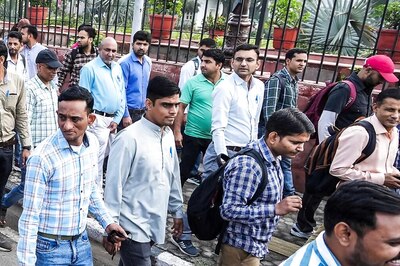
views
BANGALORE: Shielded from the urban sounds, in a lush environment is a special place for special people. Open spaces shaded by a canopy of trees with a few cottage-like structures sprinkled across the five acre land is what one can find at the Spastics Society of Karnataka.“This September the society will be completing 30 years of existence,” says Rabindran Isaac, associate director diagnostic and research centre (DRC). Isaac has been a part of the society for the last 25 years. He says that in the last decade volunteers working in many corporate giants have visited and spent time with the children at the centre.“It is a good thing that they are doing it. It helps the children.From each individual who visits the campus the children learn something new. The lesson taught could be the same, but the manner and the method would be new,” he says.He further adds that it is also beneficial for the corporate industry. “It creates awareness among them.They will be better acquainted with the situation. It is important to notice the person on the wheelchair, and not the chair,” he opines.More than twenty Sapient employees volunteered to share their time with the children at the centre. As part of Sapient’s global CSR programme — Sapient Gives Back, the volunteers worked closely with the staff and together organised interesting activities and sessions for the students at the centre.‘Sapient Gives Back’ program allows each Sapient person to spend an entire working day in a year volunteering for community service.While fun-filled activities like music, dancing and art and craft saw the kids in high spirits, the volunteers also conducted special activities to enhance creative skills of the children.The motive was to introduce them to vocational skills that they could used to support their livelihood.Specific demonstrationbased workshops were also conducted on art-related themes such as hand-painting, collage, clay modeling, card and diya-making.Senior children were also educated on important issues such as health and hygiene.Speaking about the importance of such creative activity, Isaac explains that these are some of the rudimentary processes that are adopted to gauge the child’s ability and skills. “It is through these activities that we can identify the aptitude of the child. For instance if a child enjoys painting, we will give that child special training to help him polish his talent,” he informs Sujay Mathew, senior manager, Sapient says, “This was the first time that any of us had ever visited a spastic society. We were very apprehensive at first, for we had no formal training in dealing with these children. But after the pleasantries were exchanged, the warm welcome by these children was heart warming. They were so open and friendly. After spending a few hours with these kids, we realised that we learnt much more from these children than we could ever teach them. Their zeal for things is unmatchable.”



















Comments
0 comment